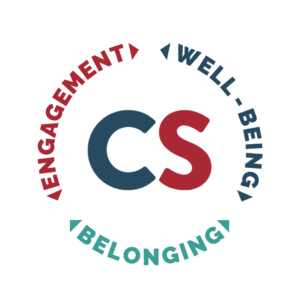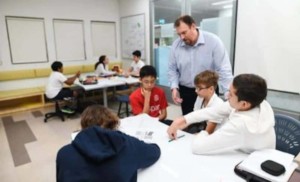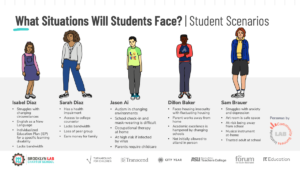Understanding Middle Schoolers: 4 Tips for Success

Understanding those on the verge of or in the trenches of middle school can be like finishing a complex puzzle only to realize there is a single missing piece — just when you think you have them all figured out, they pivot and leave you just as confused as you started. They sometimes feel like a walking contradiction: they want your love, but would prefer you did not show it in public; what makes them laugh one day, brings them to tears the next; going to school used to be the best part of their day, now they dread it. Whatever the contradiction is in your household, it is important to remember that the journey that these soon to be adults are traveling is a difficult yet AWESOME one. They are in a constant state of learning and discovery and as parents and guardians, we GET to be along for the ride!
Combine students’ physical and emotional changes with new school environments and increasing independence, and unique challenges for parents and children develop. Adolescence is a time of development, discovery and transition for kids. It is a key time for us to better understand how we increase motivation, build persistence, support the transition into a more independent experience, and prepare for future success.
As a middle school educator, my mantra was patience and understanding. I had sticky notes around my classroom reminding me that it was my job to support AND also to push these young adults to challenge themselves in new ways—even when they made me want to pull out my hair. This is a time when they need support and guidance, but they also need the freedom to have experiences on their own terms. When it comes to education, middle school is an extremely important time.
When we find ways to personalize the learning experience for students we support their transition into more independence and help activate learning. Here is what I learned about middle schoolers:
They need adults to teach them how the world works but also be conscious of how their brain is functioning. The teenage brain is prime for learning. Recent research has identified that the brain of adolescents is not yet fully developed—this actually doesn’t happen until the mid-20s. This means that, just as in early childhood, adolescents are in a critical stage where it is “easier” to learn and memorize. Teenagers also tend to be risk takers and are not as concerned with the future as adults are. This is largely due to the fact that a teenager’s frontal lobe is not yet fully connected. (The frontal lobe is associated with planning and motivation among other things!) This means that as much as I want my boys to be intentional in their social media use, in order to avoid any future repercussions. They may not be thinking of job interviews as they post pics and choose less than exemplar friends, so it will be my job to help them engage responsibly and use the channels to post the things that make them most proud. It is important that we support those conversations and help them make connections between their learning, their life and their future.
They should be held to high expectations, BUT allowed to make (harmless) mistakes. As a parent we want the best for our children. This is a good thing, but expecting perfection from your children will only lead to disappointment for you and your children. Outside of the school setting, learning by trial and error is not only acceptable, but it is encouraged. For some reason, that isn’t always the same in the classroom, where self-conscious students are often fearful of making mistakes. When students are able to make and learn from mistakes, they are able to discover concepts on their own and develop deeper understandings. The same is true outside of the classroom. I am a firm believer in setting high behavioral expectations…some might even call me strict, although I would prefer to say I am serious. Rules and guidelines are important since they set the stage for how to engage with the world, but I never want to enforce something that discourages my kids’ passions or limits their creativity. I want to remember to have a positive reaction to mistakes — I want to teach young people to reflect, reiterate and improve rather than just shut down. I want to support a growth mindset that encourages them to be confident that they are in control of their intelligence.
They need support in thinking about the future, but also need to be encouraged to embrace the present. Growing up it was never a question that I would go to college. The idea was planted early on, and I never felt the need to challenge it. With the everchanging landscape of technology, the learning opportunities for my sons may look much different that what was available to me. It may be college, but it may be another alternative. What will be most important is that I am at least starting conversations with them about what their futures will look like. They don’t have to follow the same path I did, but thinking ahead creates an opportunity to set goals and build motivation. That being said, I don’t want talk about the future to take away the value of learning for the sake of learning. Learning should feel good. And I hope to create a home environment that enables them to learn about the things that interest them. (Finding a school that supports that sort of personalization will be key as well.)
They need you to be involved, AND they need to take ownership over their learning. If you can’t let go a little during adolescence, then you might just be way more involved than you want to in adulthood. Here’s to hoping they don’t live in my basement when they’re 30. But more seriously, this doesn’t mean that you can just turn off your parenting switch. When I was a teacher, the students that had the most degree of success were those who had parents who were involved. Involvement doesn’t mean helicopter parenting, it just means that you know what is going on in children’s lives. At this age, they will be testing limits (just as the two-year-old is doing now) and gaining a better sense of what and how they can control certain aspects of their life. I want to help them develop their own sense of responsibility and ownership. I will do my best to help them find passion in what they do and model positive goal setting and reflection practices. I have become a huge fan of Logan LaPlant’s Ted Talk on Hack Schooling. This kid is a prime example of what student ownership of learning can look like. It is a reminder to me that sometimes we don’t put enough faith in our students or our children. Give them the opportunity to speak their mind and then truly listen to what they have to say!
This blog is part of our Smart Parents series in partnership with the Nellie Mae Education Foundation. For more information about the project, see Parents, Tell Your Story: How You Empower Student Learning as well as other blogs:





0 Comments
Leave a Comment
Your email address will not be published. All fields are required.